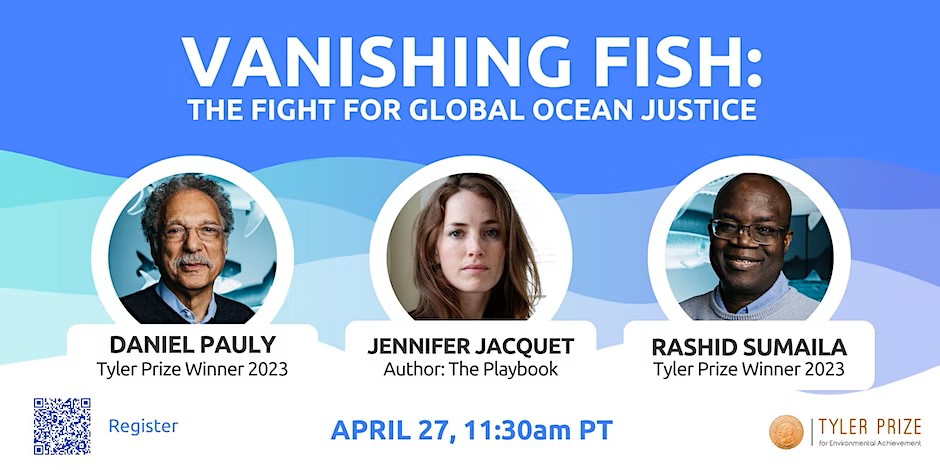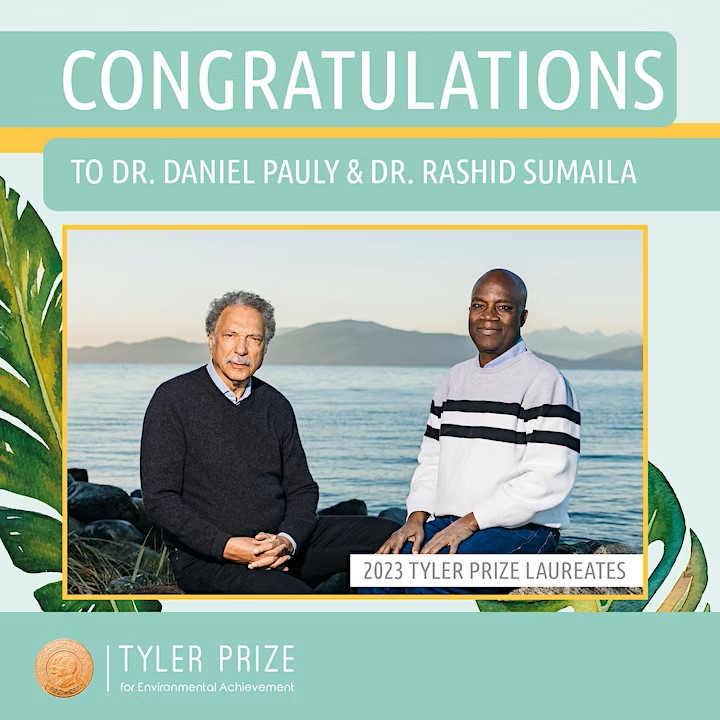Three leading environmental thinkers discuss the global fight for ocean justice, in a world grappling with the impacts of overfishing and climate change. They will also discuss the Tyler Prize Laureates‘ call to end fishing on the high seas – as well as reflect on the Tyler Prize, which is this year celebrating its 50th Anniversary.
Join us for this special in-person and online conversation at the University of Southern California (USC) – home of the Tyler Prize for Environmental Achievement.
A HISTORIC CONVERSATION
In February, the 2023 Tyler Prize for Environmental Achievement – often described as the ‘Nobel Prize for the Environment’ – was awarded to two courageous Canadian ocean fisheries experts: ecologist Dr. Daniel Pauly and economist Dr. Rashid Sumaila.
On April 27, the 2023 Laureates will present their official ‘Tyler Prize Laureate Lecture’ in this historic 50th year of the Tyler Prize. They will then be joined in conversation with environmental author and academic, Dr. Jennifer Jacquet.
* Registrants for this event will be sent an Order Confirmation email via Eventbrite with instructions on how to attend.
ABOUT DANIEL PAULY, PHD.
Daniel Pauly is the founder and Principal Investigator of the Sea Around Us initiative at the University of British Columbia. Born in France and raised in Switzerland, Pauly studied in Germany, where he acquired a doctorate in fisheries biology, zoology and physical oceanography from the University of Kiel. He has spent much of his four decades of research documenting the rapid decline of marine and freshwater fish. He gained worldwide recognition for popularizing the term ‘Shifting Baselines’ – which explains how knowledge of environmental declines fades over time, leading to a misguided understanding of change on our planet. Since 2010, he is the world’s most-cited fisheries scientist.
ABOUT RASHID SUMAILA, PHD.
Rashid Sumaila is a University Killam Professor and Canada Research Chair in Interdisciplinary Ocean and Fisheries Economics at the Institute for the Oceans and Fisheries and the School of Public Policy and Global Affairs, at the University of British Columbia. With roots in Nigeria and Ghana, he received his B.Sc. degree (Quantity Surveying) from Ahmadu Bello University (Nigeria) and his Ph.D.(Economics) from the University of Bergen (Norway). Sumaila’s research focuses on bioeconomics, marine ecosystem valuation and the analysis of global issues such as fisheries subsidies, marine protected areas, illegal fishing, climate change, marine plastic pollution, and oil spills. The question of how to “bequeath a healthy ocean to our children and grandchildren, so they too can have the option to do the same” – is what drives his life’s work.
ABOUT JENNIFER JACQUET, PHD.
Jennifer Jacquet is interested in globalized cooperation dilemmas, such as climate change and the exploitation of wild animals via fishing and the Internet wildlife trade. She is particularly interested in the role of social approval in encouraging cooperation, and is the author of Is Shame Necessary? New Uses for an Old Tool (2015) and The Playbook: How To Deny Science, Sell Lies, and Make A Killing In The Corporate World (2022). Dr. Jacquet earned a Ph.D. in Natural Resource Management and Environmental Studies from the University of British Columbia. She is currently a Visiting Professor at the University of Miami, based at the Department of Environmental Science and Policy, Rosenstiel School of Marine, Atmospheric, and Earth Science.
ABOUT THE TYLER PRIZE FOR ENVIRONMENTAL ACHIEVEMENT
Established in 1973, the Tyler Prize is awarded to recognize the scientific contributions and leadership of environmental problem solvers and to inspire others to follow in their footsteps. Recipients of the Tyler Prize are awarded USD$ 250,000.
In 2023, the Tyler Prize celebrates its 50th year anniversary. During its fifty-year history, the Tyler Prize has recognized passionate environmental science dedication across a spectrum of environmental concerns, including environmental policy, environmental health, air and water pollution, ecosystem disruption, loss of biodiversity, population, energy, and food resources.



